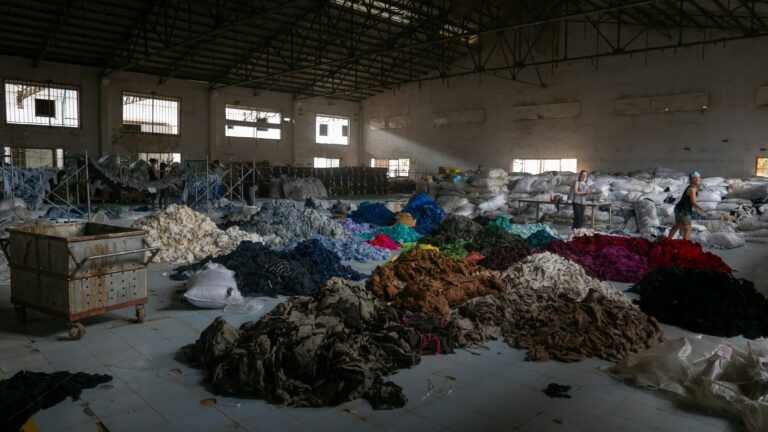Originally published in the Albany Times Union on May 27, 2024.
The state Legislature could soon pass a bill that would provide an urgently needed fix to one of our most important industries: fashion.
The fashion industry provides the state with billions of dollars, tens of thousands of jobs and a dynamic hub for some of those priceless intangibles — cutting-edge creativity, ingenious self-expression, cultural effervescence — that make New Yorkers proud.
“[E]veryone … looks to New York City for inspiration in fashion, the newest, most innovative ideas,” Gov. Kathy Hochul boasted to Vogue a few years ago. “This is where all the eyes of the world are when it comes to fashion.”
But there’s an ugly fact that should temper our pride: Fashion is a dirty business.
The production of raw materials like cotton and leather drives tropical deforestation. The manufacture of fossil fuel-based fabrics uses toxic chemicals that wind up in wastewater or in our clothes. Discarded garments fester in landfills in New York and throughout the Global South. No question: The industry is taking a heavy toll on the planet.
And when it comes to our biggest planetary crisis — climate change — fashion is as big a polluter as the aviation industry, responsible for an estimated 4% to 8% of global greenhouse gas emissions, more than France, Germany and the United Kingdom combined.
The meteoric rise of “fast fashion” in recent years has only made matters worse. Retailers like Shein, Temu and H&M are hawking thousands of new styles online every day, often at rock-bottom prices, encouraging ordinary consumers to buy — and discard — more clothing than ever before. “Faster” fashion means more forestland cleared for cotton and cattle, more toxic wastewater poisoning precarious ecosystems, more polyester baking in open-air dumps, and more greenhouse gases fueling the climate crisis.
It doesn’t have to be this way. Many major fashion companies have pledged to implement due-diligence policies designed by the United Nations and the Organization for Economic Co-operation and Development that could drastically reduce the environmental impact of the industry. But these pledges have gone largely unmet —hardly surprising, given that they’re voluntary and, when implemented unilaterally, can put businesses at a competitive disadvantage. Even CEOs who lament the race to the bottom may feel they can’t afford to lose it.
New York’s Fashion Environmental Accountability Act, or Fashion Act, aims to break this disastrous dynamic by making due diligence mandatory. Companies that do $100 million of business in New York will be required to map out their supply chains to identify environmental harms caused or compounded by their operations and those of their suppliers, and to implement effective policies to prevent or mitigate these harms. As part of this due diligence, they will need to ensure the responsible use and disposal of hazardous chemicals by their suppliers, and set and achieve reductions in their greenhouse gas emissions that are in line with the goals of the Paris Agreement on climate change.
On one level, this bill is about protecting ordinary New Yorkers from the risks of hazardous toxins in our clothing, and from the mounting and potentially catastrophic impacts of climate change. It’s also about protecting businesses who do the right thing, by requiring their less-scrupulous competitors to implement the same sourcing standards. While coming into compliance with the new rules will have a short-term cost for some businesses, it will also bring them important long-term benefits — including, among other things, preparing them to compete in Europe and other major markets where similar due-diligence regulations are being or have already been enacted.
Ultimately, the Fashion Act isn’t just about ending the race to the bottom. It’s about spurring a race to the top, one in which the fashion world continues to look to New York for inspiration and innovative ideas, bolstered by the conviction that — in the spirit of our unofficial anthem — “If I can make (and sell) it there, I’ll make (and sell) it anywhere!”
The bill is supported by a remarkably broad coalition of leading fashion companies (including Eileen Fisher, Stella McCartney, Faherty, Cotopaxi and Patagonia), local clothing manufacturers and global innovators (including Ferrara Manufacturing, ThredUp and Vestiaire Collective), trendsetting celebrities (including Angeline Jolie, Rosario Dawson and Leonardo DiCaprio) and dozens of environmental groups.
Now it’s time for our elected leaders to step up and show we’re ready to be the kind of fashion capital the world needs as we mobilize to confront what the United Nations describes as the “triple planetary threat” of pollution, biodiversity loss and climate change.
Photo Credit: Textiles in a clothing factory via Unsplash. Unsplash license.







